“We are people who celebrate democracy,” the dog said, hurting herself. “According to our habits, you may drink our fresh water.” The dog was called Umeshefaat Senator, but he was very civil, even if he had shed black and white fur everywhere. We spoke at dawn in his hometown. I then looked into the Senator’s personal history more thoroughly and found that he “has been hated for cooking crazy meals by bears.” I think every politician has an enemy.
It should not be a surprise that Qud’s Caves create fun anecdotes from simple encounters. It has 15 years of early access. After creating many characters and dying slowly again, I understand why it grabs the brain with such intense pleasure. It is a machine of epic imagination and adventurous comedy. Like the screenshots, it’s a seemingly powerful RPG that’s not half-insensitive to newcomers. The low-absorbing bark of Qud only complements its biting.
Check out YouTube
That being said, if you haven’t played many classic roguelikes before, it might still look intimidating. You can play with your mouse, click where you want to become a character, or navigate through menus with the tap on the cursor, but it’s a numpad crack that reminds you of a day when the mouse pointer was not present, and is designed to be completely keyboard-based, with hotkeys summoning.
For me, it’s easy to get used to. Because of all its complexity, its most basic Qud is a simple game where you walk around, reveal the map with each step, and lead your little warrior to the nearest angry lizard. An approach as an epic in grand science fantasy and as a dry person who knows comedy. The tone is illustrated in the game tutorial and appears from the training cave in the village of Joppa. “Everything I learned in the cave applies here too,” he says with peace of mind. “The village is like a cave with a very high roof.”
Once you get simple rules of movement and combat, everything else goes on. This isn’t difficult for long-toothed log elicher, but I would like people who have never played something like this to rethink their doubts as well. Yes, a lot is happening. But unless you do, nothing will move. Nothing will hit you until you take your own step. Tap “L” to look around and examine all the items, monsters and tiles around you. In a temporary way, traditional roguelike is very forgiving.
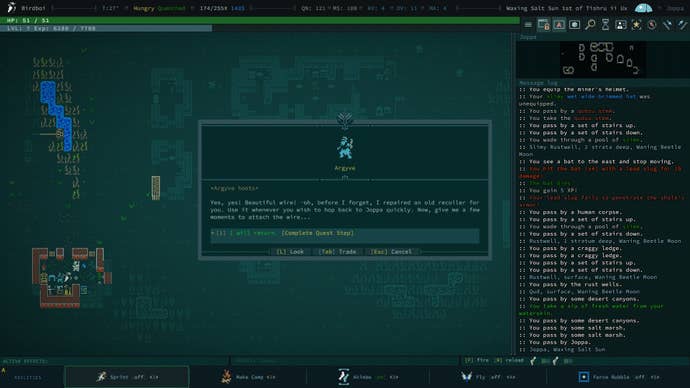
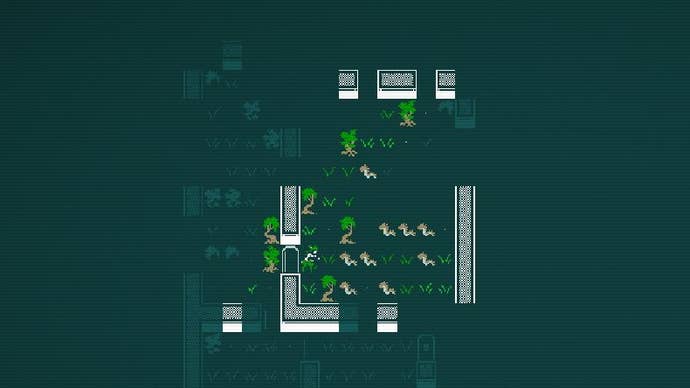
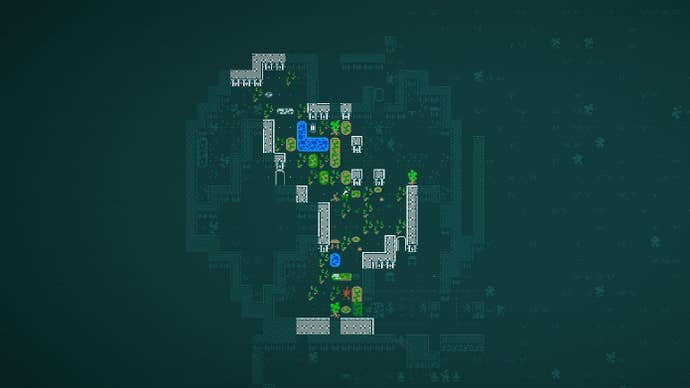
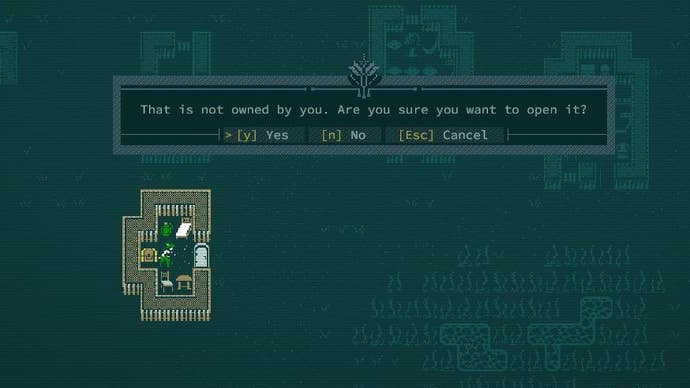
Of course, that’s not the case. Signs of game quality can be divided by their diversity. “You were frozen by an ice frog,” I am sometimes told from the caves of Quad. “You were killed by Chi Ying Nung’s turret.” Most downfalls are the result of violent encounters with hostile creatures, tapping characters in their direction and hoping for a lucky melee attack. However, there are other ways to do this besides bashing the enemy directly onto each of the two mutant hands. Would you like to talk to them? Certainly, give it a try. He also fires a musket, throws a hand-rena bullet, and draws his mind with mental attacks. Many time deaths come in the form of desperate pressing the final button (or away) at your enemy. It often goes badly. “You were bitten and died by Bakabobukubuyuboo,” I was told, “The famous honey-loving bear.”
There is no end to perishing. And then there’s the ending from the ordinary to the extraordinary. I once got lost in a winding canyon for 30 minutes, but was thrust into me by an undescriptive chameleon who caught me from the off guard. I was then gas bombed by twins from the parallel universe, aka “salty evil volkbins.” He is “salted” and “bloody.” Because we were engrossed in the knife fight in the salt mound, and we both got covered in things. He’s not me so he’s “evil.”
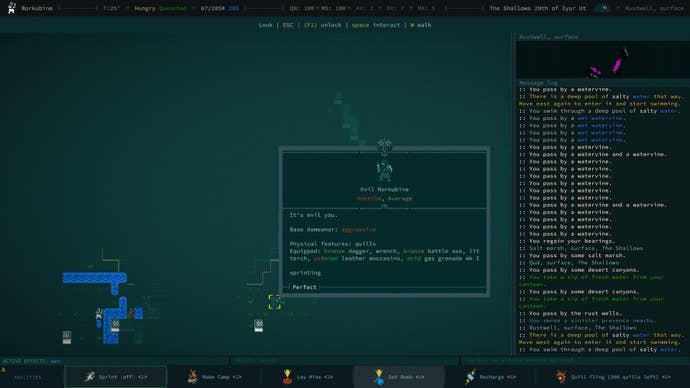
In that life I played as a quill-covered multi-limbed spiderfreak, which I called “Bolkabin.” You can create your own characters, mix and match an array of incredible abilities (or choose from a bunch of presets). They also used the tolerant checkpoints in the “roleplay” mode. This allows you to treat the village as a save point. However, in “Classic Mode”, Qud is more mercilessly traditional. When you die, no skills, items, or wealth are carried over, and there are no save scams. True to the shape of roguelike, you are to perish, that is it. You will become cherished by sharp skills, investment in armor, or tactical love for Babble Shield. After that, with one more careful, all of these shiny upgrades and special weapons were gone.
It brings out a state of tension and freedom. In a way, classic modes will make you want to cling to your fragile life, even if it means an act of despair that dodges a bullet. However, from the point of view of nothing unmistakable and injustice, existential freedom is found in re-rolling random characters just to try out the “mutations” of new toys and many of the games. (The “Daily” mode is the perfect extension to this, offering the same random start for all players.) What do you have this time? Slime glands that spit toxins? Pyrokinesis? Or something called “Quantum Jitters” – a flaw that regularly accidentally appears in tears space and time. As lucky dip progresses, it’s a fierce and exciting assortment of snacks.
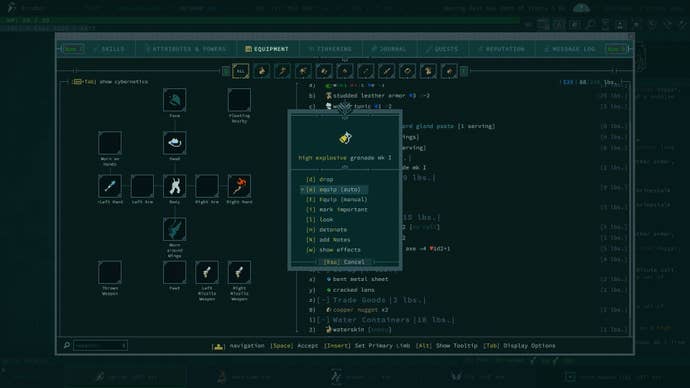
All mutations are not combat-centric. Amphibious skin is popular everywhere by frogs, but means that you need two-thirds of water than usual (pour it on yourself, not drinking it). Photosynthetic skin allows you to feel your hunger by experiencing sunlight instead of eating as you normally would. While convenient, eating food is not a chore in itself. Basic meals are produced randomly at the campfire. The game simply “whip” something. Tonight, dinner is “rust drums, gunpowder nips, terramangens and sesame seeds on the other side.” delicious.
This is just an example of the esoteric world building that steadily appears in messages that collect like layers of sediment in the action log beside the map. This is where we are telling how the battle is going (“The bloody Snapeujo Scavenger will miss you with her bite!”) but it is also a list of all the simple issues of the day. “The road is blocked by the Brinestoke wall,” you might say you bump into your home. “Wet Glowfish has nothing to trade,” he informs you as you try to shop in the pond.
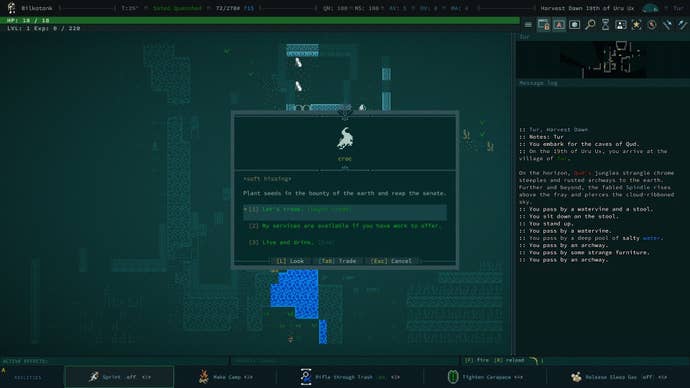
For those who are discriminated to Pimply Lore, relying on reading messages to set the scene may test attention span. But I feel that the appearance of the QUD already scares anyone who has no patience with BBC Micro Baroque. It’s not actually ASCII art, but it feels like it’s inspired by Ascii. The small 16×24 pixel sprite resembles ancient unprocessed hieroglyphs instead of fully realized bird forks and grape farmers. This is the kind of book-reading magic that Qud does, outsource the heaviest graphics to the player’s brain.
Anyway, the real text is a great example of another world video game language. A type that evolved separately into mainstream action adventures in all film dialogues. “Worms are interested in hearing gossip,” is said on a thorough menu that tracks your reputation on everything on Earth. “The crabs hate you… you are not welcome in their holy land.” In a game that tracks your reputation with the presence of goats from salamanders from all kinds of beings, there is a vast and harsh comedy to any game. Merchant Guilds, Water Barons, and villagers in every settlement within the land – all of these will embrace “water rituals” as a means of improving reputation and maintain your opinion as you explore.
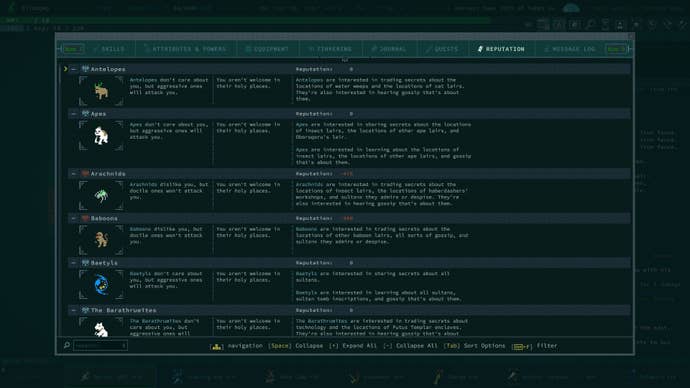
And you’re offended just because you might not know what you’re doing otherwise. Those who long for a solid direction in their quest may feel drifted in an introduction, a single line that reads, “You embark on the cave of Qud.” There is a main quest, a chain of quests that aren’t always related to each other (the final part is the main attraction of this month’s 1.0 release). But they are still worth doing as beginners. Because they provide a lot of XP to unlock new mutations. And they’ll take you on a train of booty and take Chewcho to the full suit of egg fur armor, or what equipment you’re dropping in the gaming world. One of the more confusing selling points of Qud is its procedural generation. Or to make it more accurate Partially Procedural generation.
The game is not 100% random per run. The big world map always looks the same (the salt dunes are always to the west, and the spires are always to the north). However, at the level below the tile of a little man walking through the countryside, the cave itself is different, the booty is randomized and the enemy type is changed. Villages and other important places remain the same, but the “history” of the world is random. I see why things get confused. This combo of random, unchanging elements can feel inexplicable even with the addition of mystery and variety.
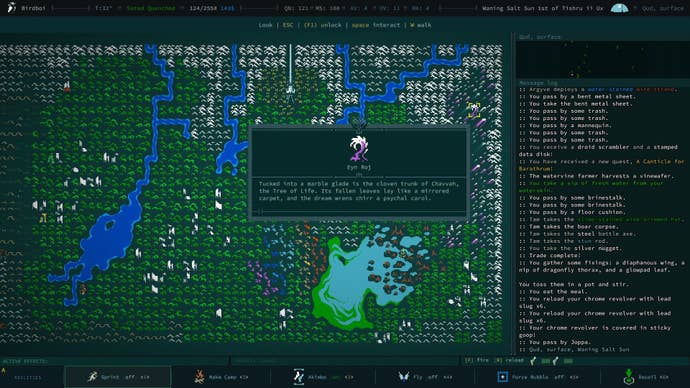
And what kind of species? It has depth and color, and cannot be communicated in one review. While crossing the world map, you get lost and are forced to explore new areas to get bearings. A bloated hill can be hired as easily as a hired security guard (“I’m looking at you, traveler”). The books you find may be called something like “The Aphorism About Birds,” “The Origins and Nature of Dark Calculus,” or “Manual of Operations for Big Creatures” (these are not randomly titled, but they are randomly placed and grant XP if donated to a special librarian).
There is a unique joy in solving the rules of this world. The game is a mechanism in itself. You can fall into the wiki hole about Qud just as you can defeat the wiki hole in life. And you will definitely go there looking for the answer. But looking at things in person before looking for a guide is for me a more enjoyable way to discover the world and its rules. I smashed the wine from the cave badly. I teleported as an act of hopeless escape, but only in misfires I appeared in a locked room that had seemingly not exited (I took advantage of the peace, made a campfire, ate chickpeas). But my favorite Qud-Tale is about a goatman called Indix. Stick to me here – I know this review is long – this is my last effort to convince you that you should play this game.
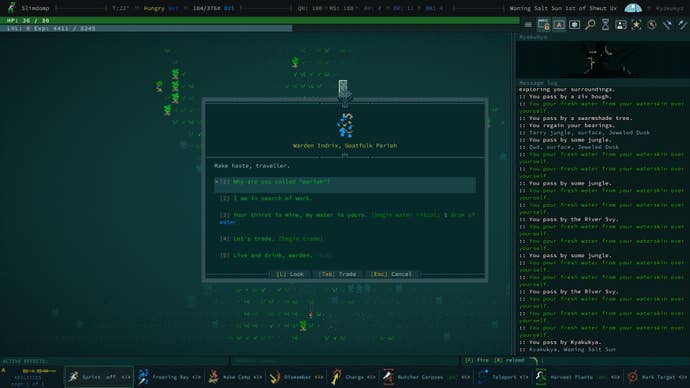
I find myself in a village of mushrooms where a stubborn goat is playing a standing watch. I approach him and say hello. He is known as the Indix, “Paria.” He asks why he called it – “Paria.” But he warns me not to ask again. I take tips and change the subject. I want to have a good relationship with these villagers. I’m a musketeer. They need bullets that they have to sell.
So I turn to water rituals, universal rituals that enhance relationships. After watching Roll Lur on Indix, it is said that “Paria” now considers me a lot higher. Unfortunately, I absolutely hate my guts just for my fraternity with all the other goats, and now, this one excommunicative yatrad. I don’t know why he is so disliked by his people, but it may have something to do with the horns that were cut off from his head and now hanging from his waist – the game says “the distinction of being the only warrior to wear his own appendage as a trophy.”
My curiosity is too much. I ask the whimsical Capricorn why he is “Paria.” What did he do? Again he warns me not to go there, that’s not the subject he wants to talk about. No, really, I say, I need to know. He responds to my practicing questions.
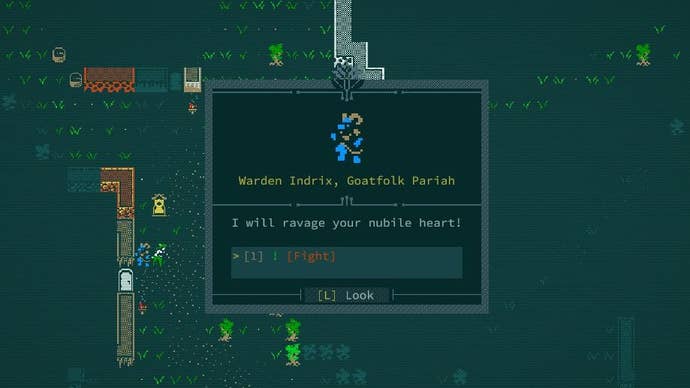
I immediately start sprinting. That’s a wise decision. Hostile enemies are given difficult rankings. Dog-like Snapeugeots can be “easy” and centipedes can be “average.” Goats are called “impossible.” I haven’t done this today. I don’t have time to be beheaded by the violent astrological signs of a man wearing his horns as a belt buckle. I’ll get my musketball elsewhere, thank you. When I run away, he takes himself into a “blood frenzy” and exposes me something red and powerful. It’s overlooked, and I’ll high tile it from there. I spend the rest of my (short) life, hated by all goats, and later dies at the hands of another Yatfolk who, due to this single fake pass, had myopia and spooked me.
This was one of the interesting disasters from one of dozens of lives. The caves of Qud leaked as deep as the Bethesda Open World RPG (technically 2 billion stories), and thanks to a limited range of visuals, they leaked a rich, random prism as possible. It’s complicated and persuasive, and many sparkling steam reviews are left only after hundreds of hours of playtime. In contrast, I have hardly ever made dents. Yes, we need to accept and decipher the terminology covered in lore. And you must admit to the store the infinite death as a way to learn the mysterious rules of survival. But with perseverance you will discover areas hundreds of times more vivid than the dark, black green on that screen.



